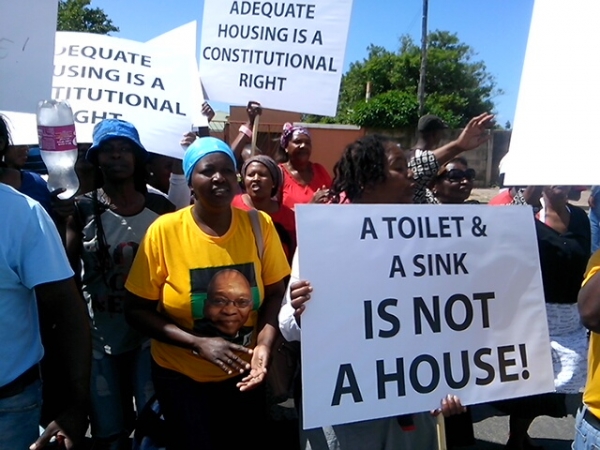By ignoring petitions, government encourages violent protest

The Eastern Cape government has failed to even acknowledge a petition from a group of housing project beneficiaries. What options does this leave aggrieved citizens, asks Mimosa Delgaro?
The right to petition government is a fundamental right of all citizens in South Africa. A petition is a way of bringing a grievance or an issue of public concern to the attention of those in power. The Bill of Rights asserts that South Africans can hold a demonstration, a picket and present a petition.
Likewise, the Promotion of Access to Information Act of 2000 protects and upholds the right of people to access information, and seeks to enhance the transparency and effectiveness of government. Public bodies are obliged to give information needed by people to exercise their rights.
It would appear that petitioning, as a means available to citizens to realise their rights is deemed less valuable in South Africa compared to protest action. The Parliamentary Monitoring Group minutes of Parliament’s Petitions Committee highlight that in a period of a year, the committee could only resolve one matter out of 6o raised with it through petitions by the public. Various reasons are attributed to this including the unavailability of committee members to attend this particular committee’s meetings and its failure to demand speedy response from various departments of issues it refers to them.
This scenario plays itself out throughout the various levels of government. The Eastern Cape Province is worse in this matter. First, the legislature has no accessible website for petitions, policies and processes. In the absence of a tool as simple as a website, it is not clear who and which committee in the legislature citizens are to direct their petitions to. Most government departments do not have accessible websites nor do they publicly present a process through which citizens should and could raise grievances with them. This is happening in a place and time where access to information is another constitutionally protected right.
Phase 3 housing development project beneficiaries of Scenery Park in East London submitted a petition to the provincial human settlements department for the attention of the MEC and the department head. The petition in essence calls for access to information and requests that the MEC sends a department official to engage these beneficiaries on a housing delivery issue that is of concern between them and the Department. Their key grievance is lack of information, feedback and clarity around the housing delivery process and they ask that the department shares information with them in a public meeting to be organised in their community.
You would think this sounds like a simple request. Thirty days later, there was neither a response from the office of the MEC of the Department of Human Settlements nor the office of the Head of Department, nor was there acknowledgement of receipt of the petition.
It is scenarios such as these that reinforce the view that government has become more unresponsive to citizen needs and continues to close down spaces or frustrate citizens in their attempts to engage the state peacefully. What then is left for citizens?
The trend has been that violent service delivery protest attracts the attention of not only government, but the media, business and others whose interests are threatened by the protest action. In fact, the trend has been that the more violent and destructive a protest, the more senior political leaders get deployed to broker the situation.
What then remains for the phase 3 Scenery Park beneficiaries and other such citizens attempting to engage government in peaceful, constitutional protected means? In comparison to the kind of attention violent protest get, petitions remain, something which can easily go by unnoticed.
The author is a member of the community from where the petition was lodged. No inference should be made on whether the views expressed in this article reflect the editorial position of GroundUp.

This article is licensed under a Creative Commons Attribution-NoDerivatives 4.0 International License.


